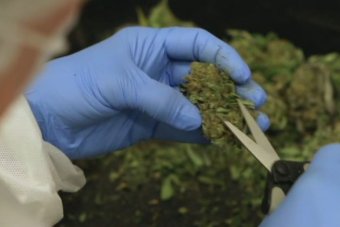
A special scheme providing medicinal cannabis to epileptic children too sick to join the upcoming standard clinical trial in NSW has shown “promising” early signs, though doctors have warned it is not a miracle cure.
About 20 severely epileptic children have so far begun receiving the cannabis-based medicine Epidiolex under the NSW Government’s Compassionate Access Scheme, with the same number again to join the scheme in the coming weeks.
Sydney Children’s Hospital neurologist Dr John Lawson is the lead investigator for the medicinal cannabis trials for paediatric epilepsy in New South Wales.
He said the children selected for the scheme were deemed too sick to take part in clinical trials, with most suffering hundreds of seizures a day.
Just over a month after starting the oil-based cannabis treatment at Sydney and Westmead Children’s hospitals, some hopeful stories are beginning to emerge.
“One mother has reported in saying that it’s like a fog has lifted from her child, with a significant decrease in the number of seizures she’s having,” Dr Lawson said.
“For the first time in years she has had her first three or four seizure-free days and on those other days is seeing half the number of seizures she was having before, so that’s a big change for them.”
Dr Lawson said she was having hundreds of seizures a day before starting the treatment.
“Another mum has reported that for the first time her child has started to communicate and is clapping her hands and doing things she hasn’t done before,” he said.
‘This drug is not a miracle cure for everybody’
But for others taking part in the scheme, there have so far been no such benefits.
“It’s only early days and we are seeing promising signs of improvement in a few children but I don’t expect that to be the case in the majority,” Dr Lawson said.
“It’s good to see the burden lifted off in some of these cases but I would expect to see half the group to in fact see no benefit at all.
“That’s what the trials overseas would be pointing towards as well.
“This drug is not a miracle cure for everybody.”
Dr Lawson said most families were realistic because their children suffered severe, drug-resistant epilepsy and had exhausted conventional treatment options.
“The kids in this trial will have had to have failed at least five or six medicines before they can even trial the cannabis-based medicine,” he said.
Success of treatment to be assessed after three months
But the scheme offered families hope.
“One of the mums when she heard her child was going to start the treatment cried with joy just to have the opportunity because she has watched her daughter deteriorate over the last few years,” he said.
So far the child had responded well to the medicine.
“Sometimes when it’s early days you get what’s called the honeymoon period so that the medicine works for a few months and then stops working but many of these families are fairly realistic about the whole thing,” Dr Lawson said.
“We will assess the children every month and at the three-month mark if there’s no benefit at all, then we’ll ask the family to stop taking the medicine because it’s not helping them.
“But in those cases where it is helping, there’s an agreement that the medicine will continue to be supplied to those families up until the time that the drug is registered in Australia.”
Because it is an experimental medication, Epidiolex has not been considered or approved by the Therapeutic Goods Administration for routine use in Australia.
But it has been trialled in the United States and Europe with positive results in some cases.
The NSW Government-sanctioned standard medicinal cannabis trials are due to begin later this year and early next year, with clinicians still working out the details for how it will be rolled out safely.
“The trials are still in the development phase and you have to be very meticulous about these things,” Dr Lawson said.
“Safety is the priority, they have to go through ethics committees for approval, and the delays in getting them up and running are normal, the delays are there for safety reasons.”
